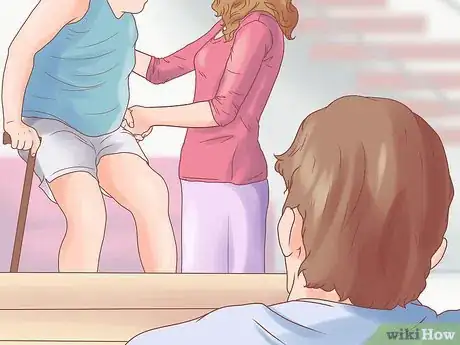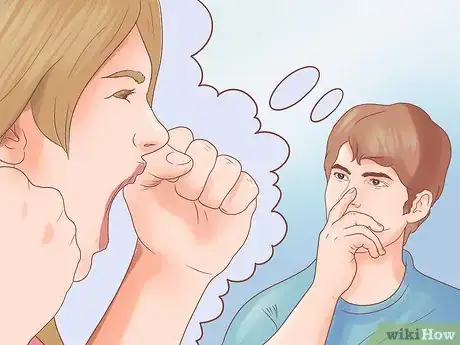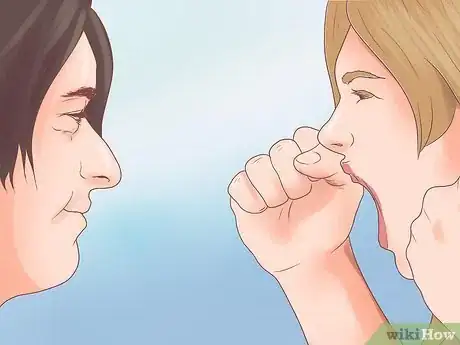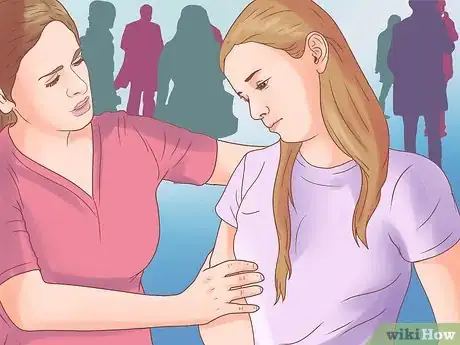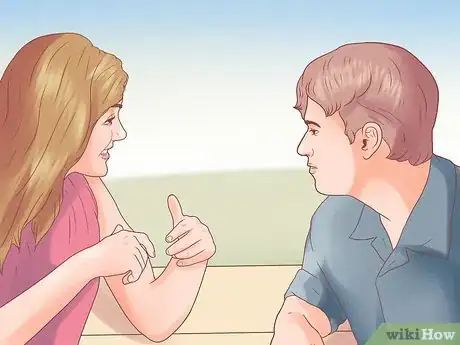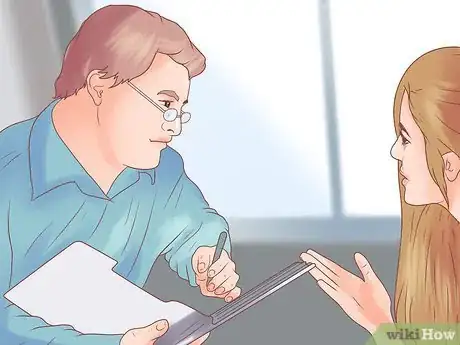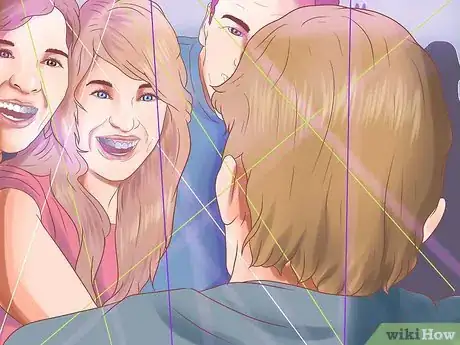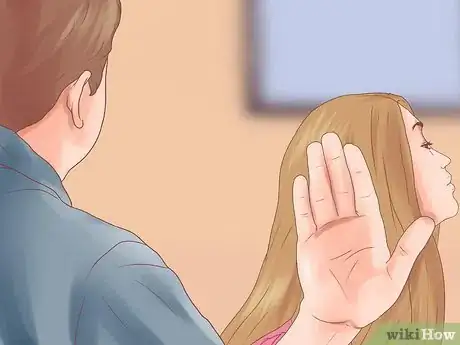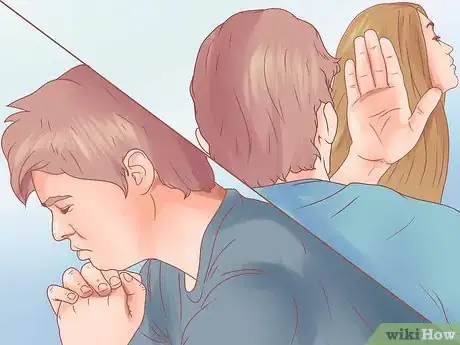This article was co-authored by Mary Church, PhD. Dr. Mary Church is a Licensed Clinical Psychologist based in Honolulu, Hawaii. With over a decade of clinical experience, she aims to integrate evolution, genetics, and neuroscience within the practice of psychotherapy. Dr. Church holds a BS in Psychology from Eckerd College and an MS and PhD in Experimental Psychology from The University of Memphis. She completed a Post-Doctorate in Clinical Psychology at The University of Hawaii at Manoa. In addition, Dr. Church is a member of the American Evaluation Association and Hawaii-Pacific Evaluation Association.
There are 12 references cited in this article, which can be found at the bottom of the page.
This article has been viewed 66,806 times.
Why do some people act unlovable? Why do some people sabotage every attempt that others make to reach out and show them warmth? In fact, there is no simple answer to this question — for some, the cause may be a misguided fear of friendly interaction, while for others, this behavior may stem from harmful past experiences or even from a disorder the person has no control over. Regardless of the cause, working to love a person who insists on being unlovable is one of the noblest (yet most difficult) things that someone can do. Show love to the people who need it more than anyone else by starting with Step 1 below.
Steps
Building a Connection
-
1Search for the good in this person. When dealing with someone that you consider to be unlovable, your first step should be to take a step back and try to reflect on the person as whole. Ask yourself: Is this person really unlovable? Does she actively resist efforts to love her, or is she just a little awkward and standoffish? Does this person really have no positive traits, or have I just not taken the time to look for any?" Try to think of ways — even small ways — in which this person has proven that they're not all bad. These can be minor acts of kindness they've performed, talents they've demonstrated, or even simply nice things they've said.
- Trying to love someone is much easier if you don't start by viewing them as "unlovable" to begin with. This is why it's such a good idea to look for some minor positive aspect of the person you're trying to love. By identifying this person's positive qualities, you're disassociating her from the "unlovable" label in your mind.
-
2Look for the root cause of this person's behavior. It's much easier to love someone who reacts to your efforts to reach out with anger or frustration if you have some sort of idea why this person acts this way.[1] Some people push others away because they've been hurt in the past and are afraid of opening themselves up to the same kind of pain, while others may simply not know how to interact warmly because they were never taught. Finally, it's also worth noting that some people may act unlovable due to a genuine personality disorder or mental illness or as the result of abuse. In any of these cases, understanding why someone who acts so difficult does this can make it much easier to love them.
- One way to learn why an unlovable person acts the way she does is to simply get to know her. In this case, you may want to read the section below on reaching out to unlovable people. However, if this person is so difficult to be around that making a connection with her is virtually impossible, you may want to try gently broaching the subject with people who know her, like her friends (assuming there are any), family, peers, roommates, and so on.
Advertisement -
3Meet anger with kindness. If the unlovable person you're dealing with has a tendency to lash out at you whenever you try to connect with him, resist the urge to retaliate. Anyone who's earned the label of being "unlovable" is probably more than used to bearing the brunt of other people's snide remarks, insults, and verbal abuse, so this will get you nowhere. Instead, make an effort to be kind to this person. React to his hostility with a smile, a kind remark, or even an offer to help with whatever's bothering him. Since this is probably an uncommon experience for him, it may surprise him, opening him up to further conversation. At the very least, it will prove to him that not everyone will meet his anger with their own.
- For instance, let's say that you're walking down the hall at school when you notice a student with a reputation as an angry, awkward social outcast approaching you. You say, "Hi!" and he glowers at you angrily. Here, if you can, you'll want to react positively without missing a beat. Smiling and saying "Have a good day!", for instance, may seem a little cheesy for an ordinary social interaction, but to this person, it may be the only kind thing anyone's said to him all day.
-
4Set a positive example for others. As hinted at above, people who are thought of as "unlovable" often are the subject of jokes, derision, and outright verbal abuse. This sort of negative attention can discourage them from having positive social interactions with others, leading to a vicious cycle where the negative actions of otherwise decent, normal people reinforce the behavior of the "unlovable" person. In these sorts of cases, changing the actions of the people around the unlovable person, rather than concentrating solely on the unlovable person, can do serious good. Try to encourage them to follow your example of treating the unlovable person with kindness even when she's being difficult.[2]
- For instance, let's say you're sitting in a classroom waiting for your professor to arrive with the social outcast from the example above and a few popular kids. If you get the chance, you may want to set the precedent of treating the outcast with kindness by trying to strike up friendly conversation with him before the popular kids even have a chance to ridicule him. Even if he reacts negatively, you'll have the chance to set the example of meeting this sort of anger with your own kindness.
-
5Listen to this person. Some social outcasts and "unlovable" people act the way they do because they feel like they can't make genuine connections with other people and, on the rare occasions when they do, they're not listened to.[3] While it can be difficult to pinpoint the "signal" of what an unlovable person actually is trying to express in the "noise" of the hostility they may bring to their interactions with you, making it clear that you're trying to do so can be enough to make an impression.
- For instance, let's say that, at lunch, you sit next to the social outcast from the example situations above because you notice that he's in the corner by himself. At first, he gives you the silent treatment, but eventually he sneers, "Geez, can't you tell I want to be left alone?" You might try responding calmly with something like, "Hey, I'm sorry, I actually couldn't tell — I was just trying to trying to get to know new people. I'll leave if you want, though." This person probably won't immediately apologize and ask you to stay, but, at the very least, he may realize that you've actually taken what he's just said into account, rather than ignoring him or dismissing his words.
-
6Recognize the signs of mental/personality disorders. Unfortunately, some people with a reputation for being "unlovable" act the way they do because of a genuine biological problem that makes it very difficult, if not impossible, for them to behave the way most people do. In these cases, the "unlovable" person's bad behavior may not be a matter of choice, so reacting negatively may not merely be ill-advised, but cruel. If you think that someone with an "unlovable" reputation is exhibiting any of the following disorders and is not receiving help, contact an appropriate authority like a counselor, social worker, or priest. You may also seek to speak with their trusted contact before disclosing any information about them:
- Clinical Depression: Sometimes causes irritability, sadness, lack of motivation, self-loathing, and reckless behavior.[4]
- Antisocial Personality Disorder: Can cause a lack of concern for others' feelings, irritability and aggression, poor impulse control, a lack of guilt or remorse, and callous, selfish behavior.[5]
- Narcissistic Personality Disorder: Can cause an inflated sense of self-worth, an excessive sense of entitlement, envy of others, a strong desire to be admired, a lack of empathy, and excessive anger in response to insults or slights.[6]
- Avoidant Personality Disorder: Can cause an extreme fear of being embarrassed or rejected, an excessively meek and restrained personality, constant anxiety, a fear of risk-taking, and awkwardness in social situations.
-
7Recognize the signs of trauma and abuse. Perhaps most tragic of all "unlovable" individuals are those who became the way they are because of some sort of external trauma or abuse. Extremely traumatic experiences, especially during childhood, can have marked impacts on the way a person, thinks, behaves, and perceives the person around her. While it can be difficult for an inexperienced person to pinpoint the signs of past abuse, seeing any of the signs below are cause for immediate concern and intervention, so contact a qualified professional (like a teacher, counselor, social worker, etc.) immediately.
- Physical abuse: Unexplained or mysterious injuries or illnesses. Injuries often justified as "accidents". May dress in clothing designed to hide marks of injury (long sleeves, sunglasses, etc.) and/or miss work, school, or social outings.[7]
- Emotional abuse: Low self-esteem, anxiety, and social withdrawal. If in the context of a relationship, this person may be overly anxious to please their partner, may avoid going out without their partner, may have restricted access to their family, friends, and/or possessions, and may have to frequently "check in" with their partner.[8]
Reaching Out
-
1Start by inviting this person to group events. If you're trying to get an "unlovable" person to come out of his or her shell, hanging out one-on-one may be awkward and stressful for both of you. Instead, try inviting this person to an event where lots of people will be in attendance. At the event, do your best to make this person feel welcome, but try not to make her feel singled-out, as this can be terribly awkward and may discourage her from attending in the future.
- For example, let's say you throw a party and invite the socially awkward outcast character from the examples above as a sign of goodwill. When he actually shows up, you're pleasantly surprised. However, you shouldn't make a huge production of welcoming him to the party or he'll get the idea that he's the center of attention, which, in his experience, has been a bad thing. Instead, welcome him exactly as you'd welcome any other acquaintance to the party. During the party, you might try starting a pleasant conversation with him, introducing him to your friends, and bringing him into group conversations if you sense he's being left out. He'll probably appreciate your help.
-
2Eventually build up to more intimate events. Over time, as this "unlovable" person becomes more comfortable at group events, you may or may not find that he naturally opens up and becomes more pleasant to be around. If he does, you may cautiously try inviting him to events with fewer people where he'll be able to have more meaningful interactions with others. You shouldn't ever feel like you have to do this — in fact, acting like someone's a close friend when you actually don't care for him is disingenuous and unkind. However, if you are starting to get along with this formerly "unlovable" person, you shouldn't be discouraged from trying this out, either.
- For instance, in our continuing example, if this person has reacted well to being invited to a few parties, you may want to invite him to hang out with a smaller, closer circle of friends when you go bowling or head to the bar. If he seems to continue to act well, you can probably safely proceed to as you would with any other friend.
-
3Don't be discouraged by negative reactions. The steps above assume that you get good reactions after you invite a formerly "unlovable" person to hang out with you. It's also a possibility that you won't get a good reaction. The "unlovable" person may revert to her former behavior or start lashing out at people at the social event, making things awkward for others. In cases like these, you can cut your losses and refrain from inviting this person to any further social events, or, if their behavior becomes too distracting, you may want to kindly insist that they leave.
- It's not necessarily cruel to stop inviting a difficult person to social events after she has already sabotaged a few — it's simply learning from experience. In cases like these, it's probably more stressful for everyone involved (including the "unlovable" person) for her to continue to attend.
Using a Religious Approach
-
1Look for scriptural guidance. Some people feel a need to reach out to those that others have deemed "unlovable" for religious reasons — for instance, because their religion calls on them to extend a loving hand to others even when it's difficult or out of a sense that this sort of selfless behavior is desirable. All major world religions more or less encourage their followers to act with love and kindness towards others, so if you're looking for inspiration in moments when it's difficult to love another person, turn to your religion's scriptures. Below is just a tiny selection of religious quotes on the subjects of love and empathy from a wide selection of world religions (many, many, more exist).
- Christianity: If anyone says, "I love God," and hates his brother, he is a liar; for he who does not love his brother whom he has seen, cannot love God whom he has not seen.[9]
- Islam: "None of you has faith until he loves for his brother or his neighbor what he loves for himself."[10]
- Judaism: "What is hateful to yourself, do not do to your fellow man. That is the whole Torah; the rest is just commentary. Go and study it." [11]
- Hinduism: "When a person responds to the joys and sorrows of others as if they were his own, he has attained the highest state of spiritual union."[12]
- Buddhism: "Compassion is a mind that savors only mercy and love for all sentient beings."[13]
- Sikhism: "Even Kings and emperors with heaps of wealth and vast dominion cannot compare with an ant filled with the love of God."[14]
- Note: because "loving the unlovable" is a phrase that's often used in a Christian context,[15] the rest of this section will reference certain Christian concepts and terminologies. However, it's important to understand that virtually all major religions advocate love of others, especially "unlovable" people, who need love most of all.
-
2Show love to the unlovable in emulation of God. God, the creator of the universe, is the source of all love. When we love, we emulate God. In fact, when we make an effort to love others even when they act in ways we consider to be unlovable, we're imitating one of the greatest traits of God of all, which is that he loves all people unconditionally. If you're having a hard time justifying your continued kindness to someone who seems not to deserve or appreciate it, try to think of your behavior less as an action you're performing for another individual and more as a way to practice God's love.
-
3Recognize that unlovable people need love most of all. As noted above, God loves all people unconditionally. However, people who have strayed from God's path, shunning his love, need love the most of all. Only through love (never through force or coercion) can these people be brought back to God's light, so, by showing them love, you are opening this spiritual door for them.
- In Christianity, returning to the love of God after doing wrong is generally considered to be one of the greatest personal victories of all (for a textbook example, see the parable of the prodigal son). By showing your love to another, you're making this victory more possible for this person.
-
4See your efforts to love this person as acts of faith. One way to motivate yourself to extend your love to a person who's making it difficult to do so is to think of this act as a sign or testament to the power of your faith. If you normally would have a hard time loving someone because of your behavior, view this as a challenge to your faith — trying your best to love this person is a way to prove your devotion.
-
5Realize that God loves this person. Some people's actions are so hurtful that it's very, very difficult to love them, especially if they've hurt you personally. Even if you can't bring yourself to truly love someone, don't forget that God loves this person just as much as he loves you. For this reason, the unlovable person is, at the very least, worthy of your kindness and forgiveness, even if you can't sincerely bring yourself to love him.
- For an inspiring story of forgiveness, see the story of Robert Rule, who famously forgave serial killer Gary Ridgway for the murder of his daughter, Linda Rule, because it was, in his words, "what God [said] to do."[16]
-
6Remember the Golden Rule. Treat other people the way you'd like to be treated — virtually every culture and religion on the planet has some variation on this rule (several are listed in the selection of quotes above). No matter what someone does or says to you, the Golden Rule dictates that you should treat them the way you'd like them to treat you. If someone's practically unlovable, keeping the golden rule in mind can help you justify your continued efforts to extend your best kindness and love even in the face of this person's hostility.
References
- ↑ Mary Church, PhD. Research & Clinical Psychologist. Expert Interview. 20 August 2021.
- ↑ Mary Church, PhD. Research & Clinical Psychologist. Expert Interview. 20 August 2021.
- ↑ Mary Church, PhD. Research & Clinical Psychologist. Expert Interview. 20 August 2021.
- ↑ http://www.helpguide.org/mental/depression_signs_types_diagnosis_treatment.htm
- ↑ http://www.psychologytoday.com/blog/hide-and-seek/201205/the-10-personality-disorders
- ↑ http://www.psychologytoday.com/blog/hide-and-seek/201205/the-10-personality-disorders
- ↑ http://www.helpguide.org/mental/domestic_violence_abuse_types_signs_causes_effects.htm
- ↑ http://www.helpguide.org/mental/domestic_violence_abuse_types_signs_causes_effects.htm
- ↑ 1 John 4.7-8, 12-13, 18-20
- ↑ Sahih Bukhari 13; Sahih Muslim 45
- ↑ Talmud Shabbat 31a
- ↑ Bhagavad Gita 6: 28 - 32
- ↑ Nagarjuna, Precious Garland 437
- ↑ Sri Guru Granth Sahib Ji
- ↑ http://www.christianpost.com/news/10-reasons-why-we-must-love-unlovable-church-members-107971/
- ↑ http://blogs.christianpost.com/videos/forgiving-a-serial-killer-12387/
